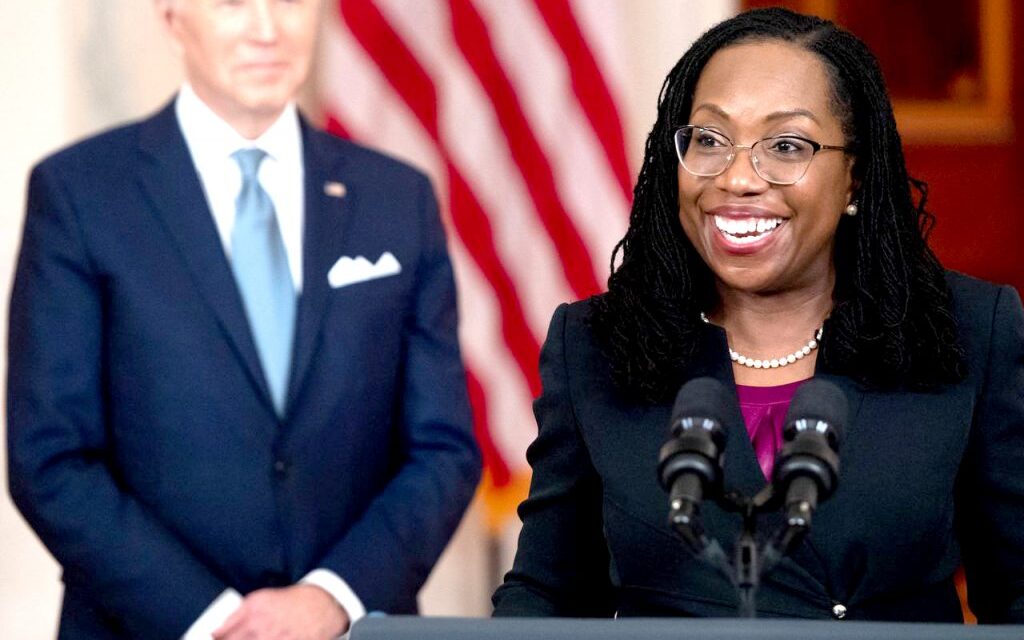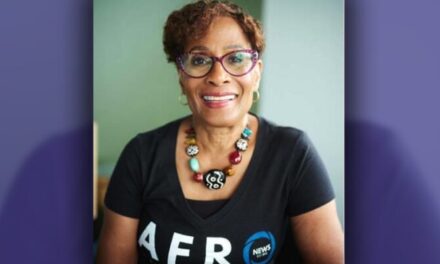By Roy S. Johnson
Judge Ketanji Brown Jackson, with President Joe Biden, speaks after she was nominated for Associate Justice of the US Supreme Court, in the Cross Hall of the White House in Washington, D.C., February 25, 2022.
This is an opinion column.
Shanta Owens was at the Birmingham-Shuttlesworth Airport Friday morning, corralling her family for a weekend trip to visit friends in Texas. A district judge in the criminal division of the 10th Judicial Circuit of Alabama, she glanced up at a television screen and saw the breaking news that President Biden would nominate Judge Ketanji Brown Jackson, a Black woman, to serve on the Supreme Court of the United States.
To be the 116th Associate Justice, the third African American, and the sixth woman to serve on the nation’s highest court.
To be the first Black woman to sit on the vaunted judicial perch.
“I immediately thought, ‘Oh my Good Lord,’” Owen shared with me via text. “My daughter could one day be a SUPREME COURT JUSTICE!”
Owens is among several Black female judges now serving in Alabama. Serving in the wake of Faya Ora Rose Toure, in the near half-century since the fiery activist was appointed as a municipal judge, making her the first Black female judge in our state.
In the wake of Carole Smitherman, who received a call in 1991 from then-Governor Guy Hunt asking her to serve on the state circuit court, the first Black woman to do so in our state.
Each of them shared a moment Friday morning, an emotional moment, at the sight of Judge Brown Jackson on their screen, or timeline. At the sight of her bright smile and studied countenance.
Even at the sight of the sisterlocks flowing beyond her shoulders.
“I always want and desire for my children to live and do better than their dad and me,” Owens added. “So, at that very moment, I felt so many possibilities and dreams for my daughter and for this world, especially in a time such as this with such racial divide in our country.”
Shared Circuit Judge Kechia Davis, who was at home preparing for court when she saw the news. “I am excited about the diversity that this nomination will bring to the Supreme Court in light of the social and economic issues we are dealing with as of late,” she shared. “It’s a huge step towards accepting women of color on every aspect of the bench and legal system. The Supreme Court should be a reflection of the country as a whole and this nomination is a huge step towards that end.”
Circuit Court Judge Javan Patton was in her office at the Jefferson County Courthouse when she heard “the exciting news.” “I am elated and eager to have an extremely knowledgeable and qualified African-American woman nominated for appointment to the United States Supreme Court,” she told me. “It is an unparalleled opportunity to show African-American females that their possibilities in the legal field are limitless.”
“I’m full!” wrote Jefferson County District Court Judge Ruby Davis. “Full of hopefulness! Full of joy! The POTUS finally got it right! Now the SCOTUS will have the balance that it so desperately needs.”
For Judge Sonja Bivins, U.S. Magistrate Judge, Southern District of Alabama, the nomination evoked thoughts of Constance Baker Motley, a law clerk for Thurgood Marshall—the first African American to serve on the Supreme Court. Motley was the first Black woman to argue a case before the nation’s highest court and, in 1966, became the first Black female federal judge.
“An out-of-state colleague contacted me this morning with the news,” said Judge Bivins. “I immediately thought of Judge Motley and the many obstacles she overcame to make this day possible.”
For some Black female judges in our state, this historic day prompted, too, a pained reminder that none like them has served on Alabama’s highest courts.
“There’s a sense of pride, hope, and relief [at Brown Jackson’s nomination],” said Judge Elizabeth French, presiding judge to the 10th Judicial Circuit. “It marks how far we’ve come to achieve a federal bench that fairly resembles and reflects our diverse nation. However, we still have work to do. There still has not ever been an African American female nominated to serve as a United States District Court judge in the state of Alabama, despite having many of my colleagues who are more than qualified to do so.”
“Words cannot adequately express how my heart feels,” wrote District Court Judge Shera Grant (and Owens’ twin). “All we need is a little hope to spark change; [Brown Jackson] represents hope for my 12-year-old daughter Maddy. Jefferson County has a majority African American bench. However, the state is lacking. There are no African Americans on the civil court of appeals, the criminal court of appeals, and the Supreme Court for the state of Alabama. That’s unbelievable in 2022. So, [Brown Jackson] provides hope for me to possibly see change in a state that has such rich racial history.”
“Overjoyed and so proud,” said District Court Judge Katrina Ross. “Long overdue. I was a little perturbed by the comments some lawmakers [previously] made about how exceptional this nominee had to be, as if, to infer that a Black woman nominee was inherently inferior. Judge Jackson has had an exceptional career and she will bring a wealth of experience to the High Court. Her experience base is far broader than that of many previous nominees including that of Chief Justice Roberts at the time of his nomination.
“Former President Trump’s nominees seldom reached the level of exceptionalism we expect to find in a fair and just judge or justice. Unfortunately, we as a country are suffering the consequences of having too many federal appointees marred in right-wing politics. With that said, for me, Judge Jackson’s nomination represents hope”
“On a more personal note,” Grant added, “she [allows] my daughter to love all of herself—natural hair and all. She gets to see that her natural hair is no barrier to ultimate success. That seems small, but it is such a huge deal. Maddy has just started to love her hair. After moving to a school with more African American students and having a teacher to wear natural hair, she no longer feels like it’s a problem.”
Smitherman, who still serves on the bench, empathized with the emotions Brown Jackson surely felt when she received the call from Biden Thursday evening saying she was his nominee.
The call from Hunt 31 years ago “sent chills down my spine,” Smitherman shared. “To know that I had gained the confidence of the state’s executive department to the degree that I could serve and make a difference. So, I can feel how Judge Brown Jackson feels right now: I know what she’s thinking. It’s an awesome responsibility she’s about to accept. She’s a breath of fresh air.”
There remains work to do before the indisputably qualified Brown Jackson takes her deserved seat on the nation’s top court. Though she’s already endured congressional scrutiny, having received bipartisan support before taking her current seat on the federal appeals court, she’ll be grilled by the Senate Judiciary Committee and must be approved by a full vote of the Senate.
There remains much more work to do here for our daughters, our Black daughters. For them to have the hope they deserve to see here on Alabama’s highest courts.











